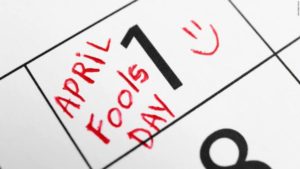The Origin of April Fools’ Day
Today Is 1st of April and Appears Over Many Many Years to Be Known As April Fool’s Day! But How Did April Fool’s Day Start, Let Us Explore the History? Have you ever thought about the origin of April Fools’ Day? It’s not as easy to pinpoint this day’s history as you might think. The history of April Fools’ day is a little more complicated than some other celebratory days.
 April Fools’ Day is one of the most light-hearted, yet most widely recognized non-religious holidays in the world. Have you ever wondered where and how has it originated? While people know that it is the day of pranking, cracking jokes, laughter and pulling people’s legs in a jest, we at Victorious Kidss Educares ~ never let a matter lie just like that and tried, in this lockdown time ~ to dive deeper to know its origin? The uncertain origins of a foolish day April Fools’ Day, sometimes called All Fools’ Day, is one of the most light-hearted days of the year. Its origins are uncertain. Some see it as a celebration related to the turn of the seasons, while others believe it stems from the adoption of a new calendar.
April Fools’ Day is one of the most light-hearted, yet most widely recognized non-religious holidays in the world. Have you ever wondered where and how has it originated? While people know that it is the day of pranking, cracking jokes, laughter and pulling people’s legs in a jest, we at Victorious Kidss Educares ~ never let a matter lie just like that and tried, in this lockdown time ~ to dive deeper to know its origin? The uncertain origins of a foolish day April Fools’ Day, sometimes called All Fools’ Day, is one of the most light-hearted days of the year. Its origins are uncertain. Some see it as a celebration related to the turn of the seasons, while others believe it stems from the adoption of a new calendar.
New Year’s Day Moves
Ancient cultures, including those of the Romans and Hindus, celebrated New Year’s Day on or around April 1. It closely follows the vernal equinox (March 20th or March 21st.) In medieval times, much of Europe celebrated March 25, the Feast of Annunciation, as the beginning of the new year.In 1582, Pope Gregory XIII ordered a new calendar (the Gregorian Calendar) to replace the old Julian Calendar. The new calendar called for New Year’s Day to be celebrated Jan. 1. That year, France adopted the reformed calendar and shifted New Year’s day to Jan. 1. According to a popular explanation, many people either refused to accept the new date, or did not learn about it, and continued to celebrate New Year’s Day on April 1. Other people began to make fun of these traditionalists, sending them on “fool’s errands” or trying to trick them into believing something false. Eventually, the practice spread throughout Europe.
Problems with This Explanation
There are at least two difficulties with this explanation. The first is that it doesn’t fully account for the spread of April Fools’ Day to other European countries. The Gregorian calendar was not adopted by England until 1752, for example, but April Fools’ Day was already well established there by that point. The second is that we have no direct historical evidence for this explanation, only conjecture, and that conjecture appears to have been made more recently.

Constantine and Kugel- Another explanation of the origins of April Fools’ Day was provided by Joseph Boskin, a professor of history at Boston University. He explained that the practice began during the reign of Constantine, when a group of court jesters and fools told the Roman emperor that they could do a better job of running the empire. Constantine, amused, allowed a jester named Kugel to be king for one day. Kugel passed an edict calling for absurdity on that day, and the custom became an annual event. “In a way,” explained Prof. Boskin, “it was a very serious day. In those times fools were really wise men. It was the role of jesters to put things in perspective with humour.”
This explanation was brought to the public’s attention in an Associated Press article printed by many newspapers in 1983. There was only one catch: Boskin made the whole thing up. It took a couple of weeks for the AP to realize that they’d been victims of an April Fools’ joke themselves.
Another story suggests that the origin of April Fool’s day is the Roman tradition of Hilaria, a spring festival held around March 25 in honor of the first day of the year longer than the night (vernal equinox day, usually falls on March 20). Festivities included games, processions, and masquerades, during which disguised commoners could imitate nobility to devious ends. While we may still not know the origin of April Fools’ Day, it’s clear April Fools’ Day speaks about pranks, fun, jokes and laughter, and is therefore here to stay.
Let’s welcome the month of April with Love, Happiness, and Peace.
 Bibliographic Reference:
Bibliographic Reference:
https://www.infoplease.com/calendar-holidays/major-holidays/april-fools-day-origin-and-history), https://www.infoplease.com https://www.rd.com/culture/origin-of-april-fools-day/







